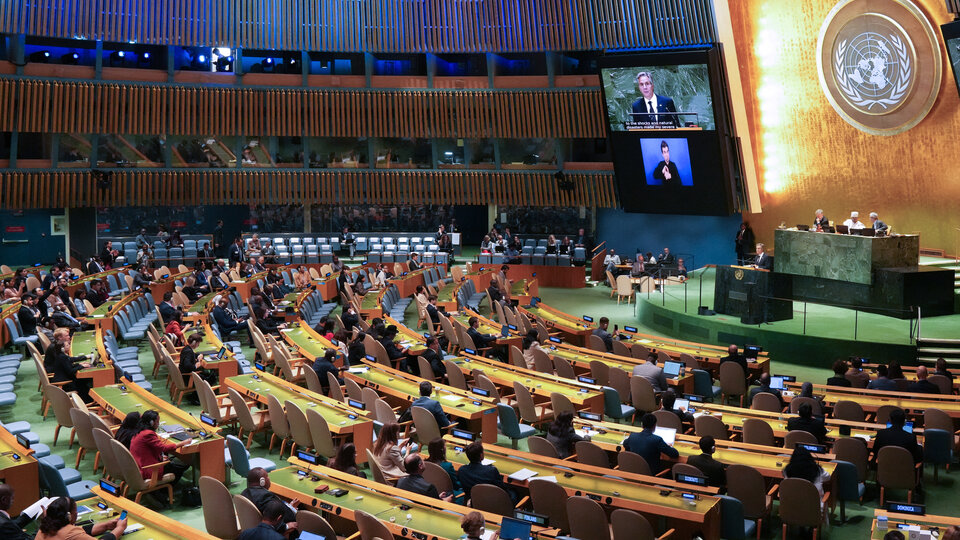
Within hours of the first text Javier M As the former president United Nations (UN), the Government of Argentina announced through Foreign Minister Diana Mondino Waives adherence to “future contract”.A Agreement It was signed by the world’s major countries to agree on principles related to the 2030 Agenda for Sustainable Development against climate change, innovation, artificial intelligence and norms for a multilateral architecture. What is the reason for rejection?
In his presentation to the UN General Assembly last Sunday, Mondino anticipated the tough speech that Milley will deliver this Tuesday before his colleagues from 193 countries in the world: among them, the major powers of the G7, such as the United States and Europe. Although the libertarian leader is fully aligned with these countries at the “values of economic freedom” level, he is against the role of international organizations such as the UN, WHO or IMF. “Co-opted by Socialism.”
According to the Chancellor, the LLA Government considers the 2030 Agenda against Climate Change, It is a project of the international left that aims to shape policies of state intervention in the economy of nations. In the same sense, they affirm, “It is an impoverished plan that restricts the freedom of individuals and the sovereignty of nations.”
Mondino’s argument focused precisely on decision making To maintain the sovereignty and independence of the country, In applying its principles of total deregulation of the economy, production and minimization of government intervention. Based on that, Miley decided to “opt out” of Argentina from the dealPrevious governments have been working for two years in line with the US and other Western and European countries, and have been opposed by other socialists like Russia or moderate countries like Brazil.
Actions against the challenges of time
He A contract for the futureIt had the support of 143 countries in the United Nations General Assembly. Predicts 56 actions to be faced “Greatest Challenges of Our Time”, Peacekeeping, climate change, gender equality, fight against terrorism and potential threats of artificial intelligence etc.
Besides, include a Global Digital CompactIt proposes strengthening international cooperation to bridge the digital divide, expand “inclusion in the digital economy” and “reduce the risks” of emerging technologies.
Also, it integrates Declaration on future generations“Promoting intergenerational solidarity, justice and equality”, “Protecting the needs and interests of future generations.”
In another example of its position on gender issues, the Argentine government essentially rejects the proposed action to achieve it. “Gender equality and the empowerment of all women and girls As a decisive contribution to advancing all Sustainable Development Goals and their targets.”
Milei disagrees with most countries on action on climate changeAs the president said at the Davos forum earlier in the year, he doesn’t agree that “humans are damaging the planet and it must be protected at all costs.” While forest fires wreak havoc in several cities in the province of Córdoba, the situation is questionable and completely out of touch with reality. Despite desperate calls from neighbors to put out the fire, the national government seems less concerned about it.
A contract for the future Based on the 2030 Agenda for Sustainable Development, It was approved by the UN in 2015, which Miley has always questioned. In fact, in the last few hours, the President, true to his style, re-issued a release reaffirming the rejection decision.
Meanwhile, 143 countries have expressed their support for this agreement in the United Nations General AssemblyLed by countries like USA, Germany, Uruguay, Israel, Ireland, Spain, Australia, Chile, Brazil, Paraguay, Ecuador and Italy.
Apart from Argentina, Russia, Nicaragua, Iran, Venezuela and North Korea opposed or abstained from voting on the deal.
Key points of a futures contract
First three points A contract for the future First, to implement the 2030 Agenda by “taking bold, ambitious, accelerated, equitable and transformative action, Sustainable Development Goals and leaving no one behind”.
Second, focus on efforts “In eradicating poverty.” The third step that the major countries of the world have promised is to take action “End hunger” and eliminate “food insecurity and all forms of malnutrition”.
In addition, “Climate change is one of the greatest challenges of our time“And we are very concerned about the current slowdown in progress,” they noted in the futures deal.
For this reason, signatory countries a “Transition from Fossil Fuels”Triple renewable energy capacity by 2030, achieve “carbon neutrality” by 2050 and continue efforts to “limit global warming to +1.5 degrees”.
They promised to “accelerate”. “Reform of the International Financial Framework”.Less developed countries can access more credit.
They agreed Reform of the UN Security CouncilTo make it “more representative” and “more effective” because it is generally blocked by the veto power of Russia, France, Great Britain, China and the United States.
In particular, they prioritized “correcting the historical injustice” of the African continent not being a permanent member of the Security Council.
He A futures contract is a blueprint Most countries face “rising existential catastrophe risks” such as wars, climate change and growing poverty.

“Introvert. Thinker. Problem solver. Evil beer specialist. Prone to fits of apathy. Social media expert. Award-winning food fanatic.”





More Stories
Two influencers drown after refusing to wear life jackets: “ruining selfies”
Uruguay 2024 election results: who won and when is the second round | Waiting to know whether there will be a runoff or not
Uruguay: Lacalle Pou leaves with his figure on the slopes | The Marcet and Asteziano scandals hit the right-wing ruler